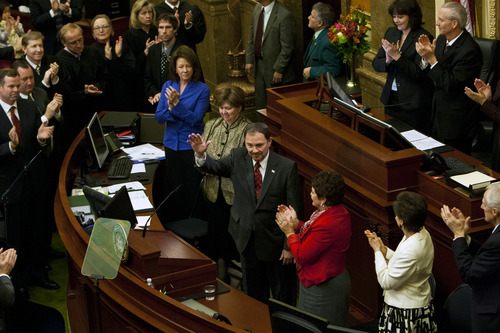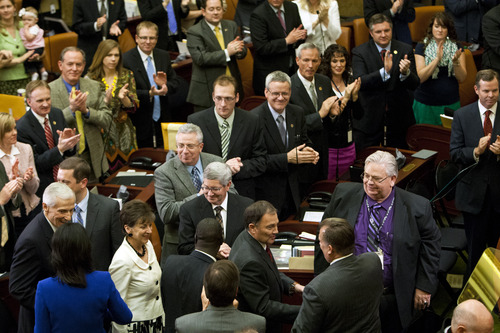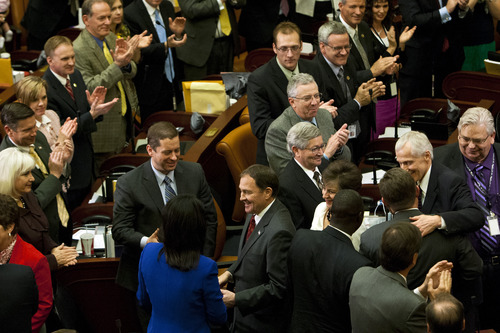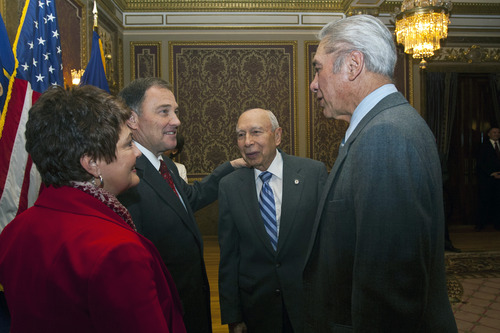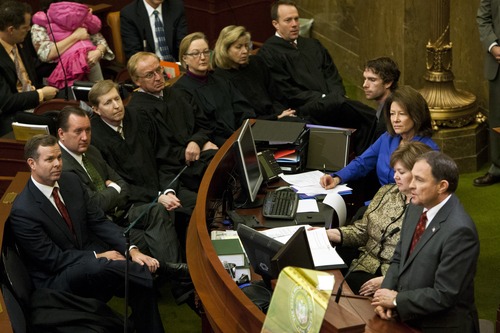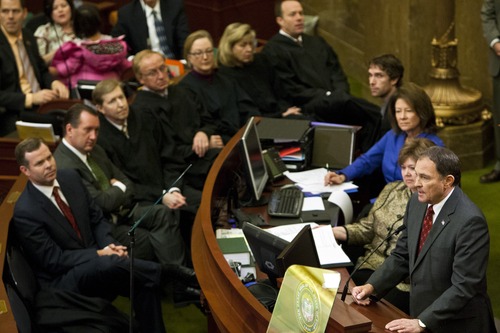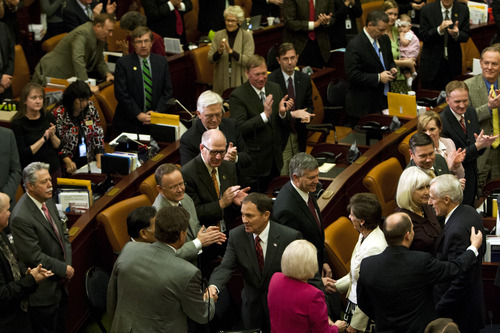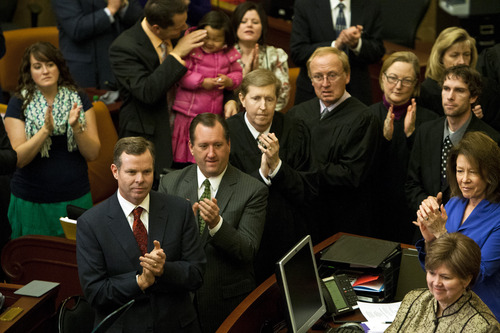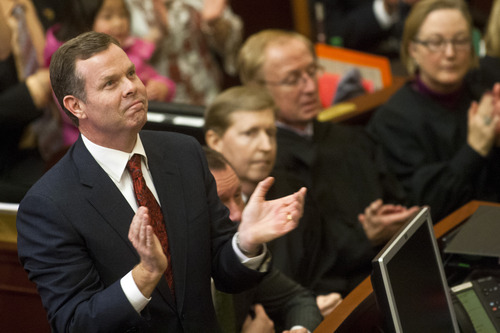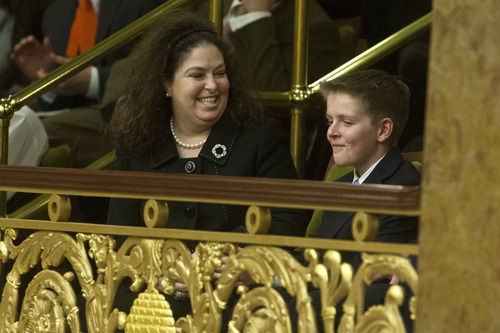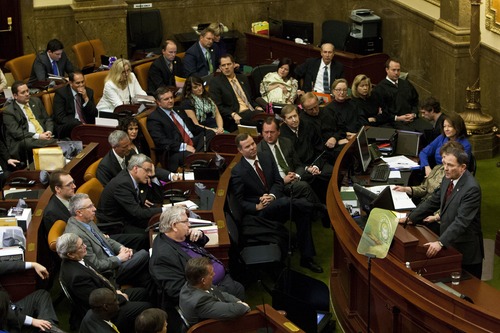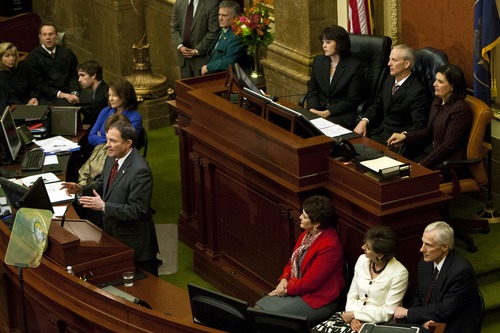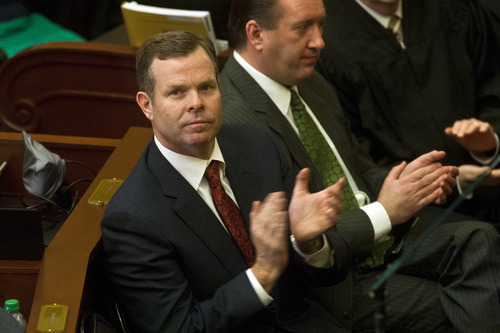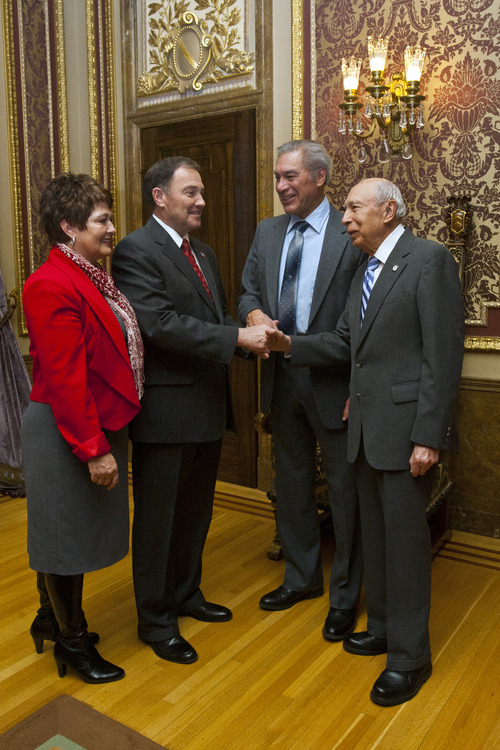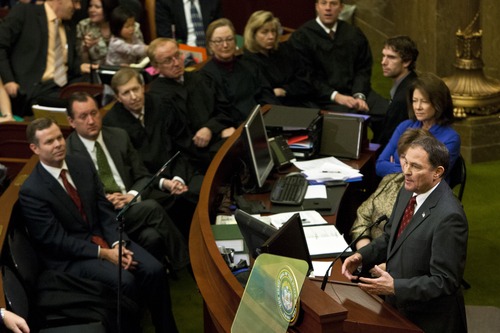This is an archived article that was published on sltrib.com in 2014, and information in the article may be outdated. It is provided only for personal research purposes and may not be reprinted.
Utah Gov. Gary Herbert struck familiar chords Wednesday in his State of the State address, describing a state on the rebound, but challenging lawmakers to remain focused on improving education and jobs, expanding energy development and maintaining air and water quality.
"We face uncertainty throughout our nation and difficult challenges here at home. But let me be clear: I have never been more optimistic about Utah's future," the governor said before a chamber filled with state lawmakers. "The state of our state is strong and continues to grow stronger."
The themes were a familiar rendition of Herbert's Greatest Hits, from the governor who has focused on the "Three E's" of education, economy and energy.
Herbert again touched on lofty goals but offered little in the way of specific policy proposals to achieve those targets.
The governor called on lawmakers to support his goal of 66 percent of Utahns having a post-high school degree by 2020. Currently less than 43 percent meet that mark.
"Since the day I took office, my number one priority has been education, the key to a robust economy," Herbert said. "Utah will achieve education excellence. We must continue to fully invest in our growing schools and we must continue to provide our students critical tools."
Utah remains mired in last place in the nation in per-pupil spending. Through the recession, policymakers managed to keep education spending essentially flat, but enrollment has increased by 9 percent during that period and class sizes have grown.
With more than 13,000 new students expected to enroll in Utah schools next year, it will cost about $100 million just to maintain the current per-pupil spending.
Kory Holdaway, government relations director for the Utah Education Association, said the teachers group supports the governor's 66 percent goal, but there is concern that the Legislature is not putting up the resources toward meeting the milestone.
"Revenues have got to be part of the equation. We can't continue to cut taxes and be able to fund growing populations of students in our schools," Holdaway said. "Getting the resources in place to be able to accomplish that will drive our economy more than anything else we can do."
Some Democrats say it is time to look at a hike in income tax — which under Utah's Constitution goes to education. A poll by the Exoro Group and University of Utah's Center for Public Policy and Administration found that 55 percent of Utahns would support such an increase.
"How can you invest in the future of Utah without dollars?" said Senate Minority Leader Gene Davis, D-Salt Lake City. "So much of it is rhetoric. We all love to talk about it, but sooner or later, we've got to do something about it."
Herbert touted Utah's recovering job market, which has created 35,800 new jobs in the past year and said he will "work tirelessly with you in the Legislature to empower the private sector to create job opportunities for every Utahn."
Specifically, Herbert said it is time to move the 700-acre Draper prison and turn it into a high-tech hub at the south end of the Salt Lake Valley.
"It's time to get serious about finding a more suitable location for the state prison," he said. A commission studied moving the prison for the last year, looking at potential locations for a new facility in Tooele County. Studies a decade ago have shown the cost of relocation would far exceed the value of the land.
Herbert called for the continued expansion of energy development, but said it must be done in a way that respects Utah's environment.
"I'll keep saying it until it's understood from L.A. to D.C.: Responsible development of Utah's energy resources and the protection of Utah's scenic wonders are not mutually exclusive ideas," he said.
But Herbert acknowledged that poor air quality is a problem that undermines Utah's quality of life, and encouraged Utahns to find ways to reduce inversion-causing emissions, find more energy-efficient technologies and reduce water consumption.
House Minority Leader Jennifer Seelig, D-Salt Lake City, said she approved of the governor's calls for conservation, "but I definitely think we need to go further."
"Government can be a leader and we really need to invest in that area," she said. "One thing that was troubling to me was the promotion of the free-market as a cure-all."
Lionel Trepanier, with the group Utah Tar Sands Resistance, who protested before the speech outside where Herbert was to give the address, said the governor's approach to expanding fossil fuels is incompatible with clean air.
"It's very imbalanced and the proof is right in front of people's eyes and their own doctors tell us it's endangering their children," he said. "I think it's a farce. The governor's proposal [for clean air] is a farce."
Twitter: @RobertGehrke —
Herbert shoutout
Gov. Gary Herbert gave a shoutout in his State of the State address to Allyson Gamble, a state employee whose remarkable experience of twice being a heart transplant recipient has made her's a powerful voice for organ donation and strength in the face of adversity.
Herbert chose to single out Gamble in his remarks as a way to highlight a Utah medical company that designed a device that helped relieve pressure on the 44-year-old's heart. But it was also a nod to a member of the political family on Capitol Hill.
• Read her story on our website. > bit.ly/YFBFRK


